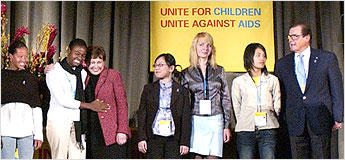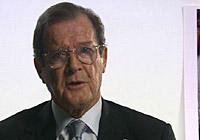The Global Launch of the UNICEF/UNAIDS campaign:
Unite for Children
Unite for Children
Unite Against AIDS
(Click HERE for more information)
The day began with the launch taking place in the Trusteeship Council Chamber at the General Assembly. Kofi Annan addressed the urgency of taking action on this issue, followed by Ann Venneman mentioning the role UNICEF will play in the global campaign. UNICEF Goodwill Ambassador Sir Roger Moore moderated and several testimonials were given. The event ended with the "Strings" song.
(Testimonial from Namibia, Jamaica, Ms. Venneman, Testimonial from Indonesia, Ukraine, Korea and Sir Roger Moore)

The Strings.
Pakistan's No. 1 Rock Band.

The Strings.
Pakistan's No. 1 Rock Band.
My task in the launch was to escorte UNICEF Goodwill Ambassadors Sir Roger Moore and Alyssa Milano to the Inodnesian Lounge (the VIP room) and to the conference room. Side note: I didn't even recognized Alyssa Milano. I had to read her name tag before realizing it was her.
Sir Roger Moore (Bond, James Bond)
UNICEF hosted ample events throughout the day including Mrs. Annan opening a photo gallery in UNICEF House, a "technical" roundtable on AIDS, a "youth" roundtable, a reception and a lighting of the logo on the GA building.
I was fortunate enough to go to the "youth" roundtable where Ronan Farrow (Mia Farrow's son) moderated, Alyssa Milano acted as the celebrity activist and 5 youths gave their testimonials followed by a Q&A session.
The day was a big sucess! Read below.
Children: The Missing Face of AIDS
UNICEF and UNAIDS Launch Global Campaign to Invigorate Action
for the Millions of Children Affected by HIV/AIDS
NEW YORK, 25 October 2005 – UNICEF, UNAIDS and other partners today launched a global campaign focusing on the enormous impact of HIV/AIDS on children, saying it was a disgrace that fewer than 5 per cent of HIV-positive children receive treatment and that millions of children who have lost parents to the disease go without support.
UNICEF said that children affected by the disease are the "missing face" of AIDS – missing not only from global and national policy discussions on HIV/AIDS, but also lacking access to even the most basic care and prevention services. Millions of children are missing parents, siblings, schooling, health care, basic protection and many of the other fundamentals of childhood because of the toll the disease is taking, the two UN institutions said.
Launching the global campaign – Unite for Children, Unite Against AIDS – at the United Nations with Secretary-General Kofi Annan, UNICEF Executive Director Ann M. Veneman and UNAIDS Executive Director Peter Piot noted that every minute:
-A child dies of an AIDS-related illness
-A child becomes infected with HIV
-Four young people aged 15-24 become infected with HIV
In addition, an estimated 15 million children have lost at least one parent because of AIDS. Yet less than 10 percent of children orphaned and made vulnerable by AIDS receive public support or services. In sub-Saharan Africa, where the impact is greatest, coping systems are stretched to the limit.
"Nearly 25 years into the pandemic, help is reaching less than 10 percent of the children affected by HIV/AIDS, leaving too many children to grow up alone, grow up too fast or not grow up at all," Secretary-General Annan said. "Simply put, AIDS is wreaking havoc on childhood."
Veneman said that in some of the hardest-hit countries, particularly in sub-Saharan Africa, the AIDS pandemic is "unravelling years of progress for children." She noted that concrete measures to address the impact of AIDS on children would be essential to meeting the Millennium Development Goals.
"In the past quarter-century, HIV/AIDS has claimed the lives of more than 20 million people and lowered average life expectancy in the hardest-hit countries by as much as 30 years," Veneman said. "A whole generation has never known a world free of HIV and AIDS, yet the magnitude of the problem dwarfs the scale of the response so far."
The global campaign aims to achieve measurable progress for children based on internationally agreed goals in four key result areas:
-Prevention of mother-to-child transmission : The vast majority of the
half-million children under the age of 15 who die from AIDS-related illnesses every year contract HIV through mother-to-child transmission. The campaign aims by 2010 to provide 80 percent of women in need with access to services to prevent transmission of HIV to their babies. Currently less than 10 per cent of women have access to these services.
-Pediatric treatment : Less than 5 per cent of HIV-positive children in need of AIDS treatment are receiving it, and only 1 per cent of children born to
HIV-infected mothers have access to cotrimoxazole, a low-cost antibiotic that can nearly halve child deaths from AIDS by fighting off deadly infections. The campaign aims by 2010 to provide antiretroviral treatment and/or cotrimoxazole to 80 percent of children in need.
HIV-infected mothers have access to cotrimoxazole, a low-cost antibiotic that can nearly halve child deaths from AIDS by fighting off deadly infections. The campaign aims by 2010 to provide antiretroviral treatment and/or cotrimoxazole to 80 percent of children in need.
-Prevention : Adolescents and young people age 15-24 account for roughly half of all new HIV infections, but the vast majority of young people have no access to the information, skills and services needed to protect themselves from HIV. The campaign aims by 2010 to reduce the percentage of young people living with HIV by 25 per cent, in line with agreed international goals.
-Protection and support of children affected by AIDS : By 2010, it is estimated that there will be 18 million children who have lost at least one parent to AIDS in
sub-Saharan Africa alone. Well before parents die, children – especially girls – have to take on adult tasks such as caring for the sick, looking after younger siblings, generating income to pay for health costs, or producing food. Often they must drop out of school. The campaign aims by 2010 to reach 80 per cent of children most in need of public support and services.
sub-Saharan Africa alone. Well before parents die, children – especially girls – have to take on adult tasks such as caring for the sick, looking after younger siblings, generating income to pay for health costs, or producing food. Often they must drop out of school. The campaign aims by 2010 to reach 80 per cent of children most in need of public support and services.
UNICEF said that children must be at the forefront of the fight against AIDS. According to UNAIDS, $55 billion will be needed over the next three years, $22 billion in 2008 alone, to confront the AIDS pandemic. There is currently a funding gap of at least $18 billion from
2005-2007. Not only does AIDS funding need to increase dramatically, but a significant portion should be specifically targeted for children affected by the disease.
2005-2007. Not only does AIDS funding need to increase dramatically, but a significant portion should be specifically targeted for children affected by the disease.
The two organizations welcomed the commitment of a number of governments to prioritize children affected by HIV/AIDS by allocating funding to children.
"AIDS continues to tear apart families and communities, leaving behind 15 million orphans and robbing countries of their future," said UNAIDS Executive Director Peter Piot. "If countries are to develop, we must put children first. Children must therefore be a major priority when it comes to the way we allocate and use resources."
National leaders participating in events to launch the campaign around the world include the Presidents of India, El Salvador, Brazil, Mozambique and Djibouti; the Prime Ministers of the Netherlands, Ireland and Trinidad and Tobago; and the Foreign Minister of Australia.
(from UNICEF NEWs)




2 comments:
My sister is cool and this is my first comment. JT
Saving the world and taking names.
And, all in a day's work...so very cool :)
Post a Comment